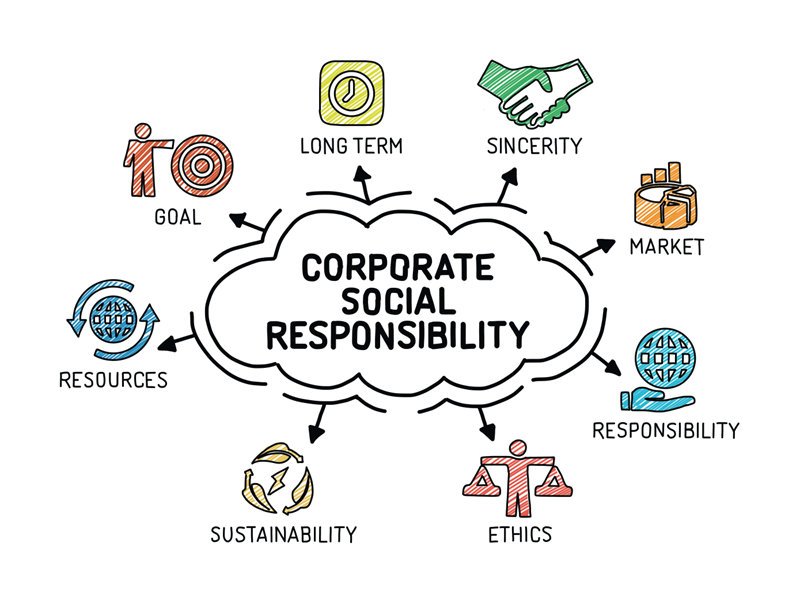Wondering How to Manage Your CSR? Let us help you through!
Have you ever wondered how a business can not only thrive financially but also make a positive impact on the world? Today, corporate social responsibility (CSR) isn't just a buzzword; it’s an essential pillar of modern business strategy. Adopting practices that prioritize the planet and its people sets a new standard. By focussing on eco-friendly products, businesses show that responsible practices not only build goodwill but also meet consumer demands for sustainability. In this blog, we’ll explore the transformative power of CSR and how integrating these principles can serve as both a force for ethical engagement and a strategic business advantage, promoting a sustainable future for all stakeholders.
Understanding CSR and Its Importance
Corporate Social Responsibility (CSR) is a business model where companies integrate social and environmental concerns into their operations and interactions with stakeholders. It is not just about donations or charity but involves a commitment to act ethically and contribute to economic development while improving the quality of life for the workforce and their families, as well as for the local community and society at large.
The broader impact of CSR extends beyond the immediate benefits to a company and its employees. By prioritising sustainable living and responsible resource management, businesses can significantly reduce their environmental footprint. Moreover, CSR initiatives often lead to improved relationships with the community, promoting a positive image that can attract both customers and talent. Ultimately, these practices promote a sustainable and inclusive society, underscoring why CSR is not just beneficial but essential in today’s business landscape.
Role of Eco-Friendly Products in CSR
Incorporating eco-friendly products into business operations is a pivotal aspect of corporate social responsibility (CSR). When companies choose products that minimise environmental impact, they not only adhere to ethical practices but also contribute to sustainable development. This approach helps in conserving resources and reducing waste, aligning corporate objectives with global sustainability goals.
Specifically, products like:
- Biodegradable Materials: These reduce landfill waste and decrease the harmful environmental impact.
- Recycled Goods: Utilising recycled materials saves natural resources and reduces energy consumption associated with manufacturing new products.
Using these types of products demonstrates a company's commitment to responsible business practices. It not only improves a brand’s reputation but also influences consumer behaviour, encouraging a shift towards more sustainable consumption patterns. Through these actions, businesses play a crucial role in promoting a healthier planet and society.
Sustainable Living and Green Practices
Businesses adopting sustainable living principles significantly impact both their operational footprint and community influence. By incorporating sustainability into their core operations, companies can lead by example, showing that practical, everyday actions can lead to significant environmental benefits. This approach not only meets CSR obligations but also resonates with increasingly eco-conscious consumers.
Enva Plax demonstrates this commitment through:
- Green Stationery: Offering items like bamboo steel coffee tumblers and wooden combs, which are both practical and environmentally friendly.
- Eco-Friendly Packaging: Utilising jute pouches and bamboo straws, these materials are sustainable and reduce reliance on harmful plastics.
These examples illustrate how integrating eco-friendly alternatives into product lines and packaging can help businesses reduce environmental impact while enhancing customer perception of their brand. Through these initiatives, companies can effectively promote sustainable practices among their customers and within the broader community.
Innovative CSR Approaches with Enva Plax
Enva Plax is at the forefront of corporate social responsibility (CSR) with its innovative range of plantable products and eco-conscious gifts. These items are not merely products; they are proof of the company's commitment to sustainability and environmental stewardship. By offering goods like seed-embedded papers and biodegradable plant pots, Enva Plax provides consumers with the tools to directly contribute to greener environments.
The impact of these innovative products includes:
- Encouraging a Zero Waste Lifestyle: Plantable items turn into greenery instead of garbage, promoting waste reduction.
- Promoting Sustainable Home Goods: Products designed for reuse and sustainability, such as compostable items and recyclable decor, help consumers maintain an eco-friendly home.
These initiatives exemplify how businesses can influence consumer habits towards sustainability. Through such products, Enva Plax not only aligns with global sustainability goals but also inspires customers to adopt a lifestyle that supports the planet.
Benefits of Integrating CSR with Core Business Strategies
Integrating corporate social responsibility (CSR) into core business strategies offers significant advantages:
- Brand loyalty: consumers are increasingly likely to support companies that demonstrate ethical practices. Committing to CSR can cultivate a loyal customer base that values sustainability.
- Improved Public Image: Engaging in social and environmental initiatives improves a company's reputation. This positive public image can attract new customers, talented employees, and even potential investors.
- Financial Incentives: Many CSR practices lead to cost savings through efficient resource use and waste reduction. Additionally, companies may benefit from tax breaks, subsidies, and other incentives aimed at promoting sustainable business practices.
These benefits show that CSR is not just a moral obligation but a strategic advantage that can contribute to a company’s long-term success.
Steps to Implement Effective CSR Programs
Implementing an effective corporate social responsibility (CSR) program involves strategic planning and commitment.
- Define CSR Objectives: Clearly outline what the company aims to achieve with its CSR efforts, focussing on areas like sustainability, community engagement, or education.
- Engage stakeholders: Collaborate with employees, customers, and community leaders to gain insights and support for CSR initiatives. This ensures the program aligns with both company values and community needs.
- Integrate CSR with Business Operations: Incorporate sustainable practices into daily business operations, such as using eco-friendly products and reducing waste.
- Measure and Report: Regularly track the impact of CSR activities and report these results to stakeholders. Transparent reporting helps maintain trust and demonstrates the company’s commitment to its CSR goals.
- Review and Improve: Continuously assess the effectiveness of CSR initiatives and make adjustments as needed. This iterative process helps refine strategies and improve overall impact.
Corporate social responsibility is more than a trend; it is a transformative force that can reshape business landscapes. By promoting ethical practices and prioritising sustainability, businesses not only contribute to global environmental goals but also improve their market standing. Sustainable living isn't just beneficial; it's necessary for future-proofing a business in today’s eco-conscious market.
We invite you to join us at Enva Plax in our journey towards a greener tomorrow. Explore our range of sustainable products and discover how your business can benefit from implementing effective CSR strategies. Together, we can create a more sustainable and responsible world.
Visit Enva Plax today to learn more.







